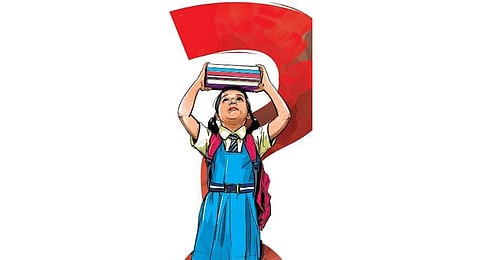

HYDERABAD: Manorma (name changed), a 46-year-old domestic worker in a posh locality of Hyderabad never received a formal education. She can only speak in Telugu and cannot read or write, except making signatures for documents, which to her represent only lines and symbols. She earns around Rs 8,000 a month by working full-time at a retired doctor's house and working part-time in two apartments that the doctor has rented out in the same building. Her husband works as a caretaker for the building. The combined income of the couple is Rs 25,000 per month. The couple have two children, an 18-year-old daughter who will get married next month and a 13-year-old son. The daughter, who went to school up to class 12, can speak, read and write Telugu but only has basic literacy in English. She discontinued her education after class 12.
On being asked why she did not send her daughter to college, she replied, “What would she do with a college education? She went to school in Warangal, at my sister’s place. We are not comfortable sending her away at this stage.”
There are many women in the state who cannot even read and write their names. Even those who receive formal school education, are not able to upskill themselves to at least make a living, let alone learn and gain knowledge for personal development and growth.
The literacy rate refers to the total percentage of the population of an area at a particular time, aged seven years or above, who can read and write with understanding. In Telangana, the literary rate is 66.54 per cent, which is less than 72.98 per cent, the all-India average, as per the 2011 census. Literacy in rural areas is 57.30 per cent as opposed to 67.77 per cent in India.
Moreover, there is a huge gender gap in literacy in the state. As per the findings of the ‘Household Social Consumption on Education in India’ report, released by the Ministry of Statistics and Programme Implementation in 2020, the literacy rate among males in rural areas is 70.6 per cent and among females, it is 53.7 per cent. Similarly, in urban areas, it is 91.7% among males as opposed to 79 per cent among females.
Despite stark differences between rural and urban areas as well as between the genders, the annual budget for education was slashed by the state government. It stands at only 6.57 per cent of the total outlay of Rs 2,90.396 crore. “In spite of all the claims made by the government, there is a gap between education levels of men and women and basic lapses in learning among youth, especially in the rural sector,” said Adithya M Reddy, TPCC delegate from Sanath Nagar. “The farmer community we interact with, almost 5,000 to 10,000 people we have interacted with in the last few years, I would think, a majority of them do not even have the primary education, let alone secondary education and even the children end up in an entirely different job set,” he said.
“When you come to the urban sector, women study only till class 10 or intermediate and have one to three children dependent on them. Among 5-8000 women I have met in Sanath Nagar or Secunderabad, a lot of women who live in slums or low-cost housing settlements, are mostly drop-outs. The preference of males continues to dominate the state. Second, women in the urban sector are employed but income is a huge issue. Rs 6,000 is the baseline of just this sample. How can you afford education, even if it is a government school, accessibility is not there. I met some parents who said we live in the city and we have to put our kid in Warangal because they don't have the facilities here,” he added.
Highlighting the need to focus on socio-economic groups to target education, Reddy said the government needs to overhaul the education system at each level and demanded that the government should make schools available in every village. He also suggested making online education available in rural areas. In order to reduce the gender gap in the state, he suggested that making the school environment safe and secure should be the first priority. He also added that teacher education is in a bad state in Telangana and the government should focus on training and upskilling of teachers.